How Much Does a Wheelchair Ramp Cost in 2025?
People often ask, “how much does a wheelchair ramp cost?” The answer is, it depends. There are several factors that influence the price of a home accessibility wheelchair ramp. Let's explore things further!
The cost to install a wheelchair ramp at a home or business can widely vary based on type of ramp material and the configuration required where the ramp will be installed. What's most important is that your wheelchair ramp is safe and allows a person to enter and exit a home or building easily and safely.
Estimating Wheelchair Ramp Pricing
A thorough home evaluation by a certified home accessibility specialist is the first step in receiving an accurate price of a wheelchair ramp for your home or building. A trained eye will assess the area with steps or uneven flooring to come up with the best ramp options for your needs.
Except for portable ramps, you should plan on a level platform of at least 5 feet by 5 feet at the doorway. This makes sure you can open and close the door and use the ramp safely without falling or rolling backward on the slope of a wheelchair ramp. Also, this makes a smooth threshold so that a wheelchair or walker can easily roll between the ramp and home. All wheelchair ramps should be at least 3 feet wide.
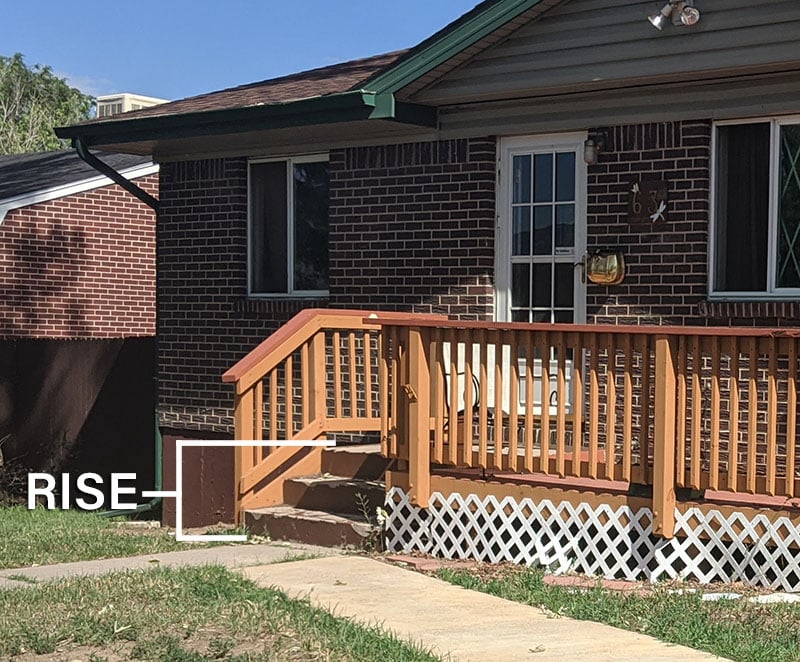
Another factor to consider before installing a handicap ramp is the rise of the stairs needing to be overcome. Rise is defined as the vertical height of the steps or stairs leading into a home. Essentially, how many steps are between you and getting in the door. You can measure the total height or count the steps. Each step is 7-8 inches high. If you have 3 steps, you can plan on a total rise of 21-24 inches. For an exact measurement, this can be measured from ground level to the top of the highest step that is level with the main entryway (see picture).
Know that for every 1 inch of rise, 12 inches of ramp will be required.
Aluminum Wheelchair Ramp Pricing
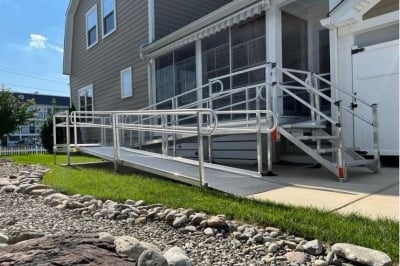
Pricing for an aluminum wheelchair ramp, also known as a modular ramp, depends on the amount of ramp (materials) required. Modular handicap ramps are a good alternative to those made of wood or concrete as they can be moved, changed, or resold when no longer needed. Also, because a modular ramp is made of aluminum, there is no rust, no painting, and no major maintenance that is required, except maybe for the occasional sweeping.
The cost of a residential aluminum wheelchair ramp starts at about $1,000 and can exceed $10,000, depending on the amount of material (metal) required and the complexity of the installation area. Commercial aluminum ramps are typically more expensive than residential applications, and range between $5,000-$20,000 on average, but can exceed $20,000 depending on the length & configuration of the ramp.
Handrails are almost always included for safety and the price doesn't necessarily go down without them. Wheelchair ramps are typically quoted per linear or square foot, although some websites will provide pricing by ramp part, so it's important to understand the differences.
It's important to know that prices on other websites or online price lists may not be updated regularly and may be out of date. Some sites may also exclude shipping or other hidden fees from the prices they list online.
For a formal aluminum modular wheelchair ramp quote, please contact us.
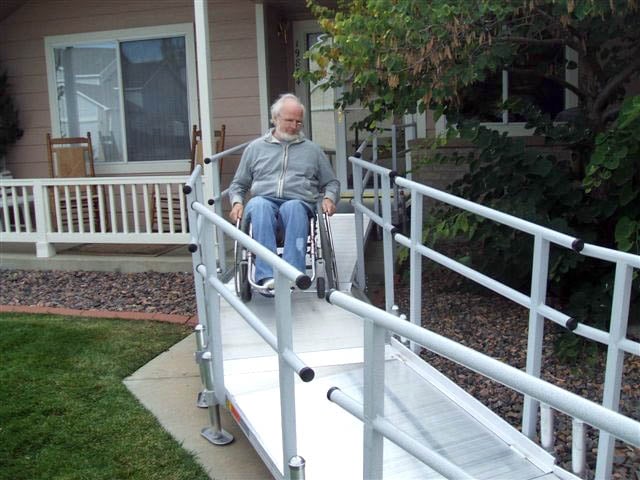
Portable and Threshold Ramp Prices
Portable ramps are a good option for 1 or 2 steps with 1-14 inches of height. A portable wheelchair ramp is usually made out of aluminum so that it is light enough to carry and many fold up like a suitcase. Prices depend on the length of the ramp, which can range between 2 to 10 feet. A basic 2-foot ramp starts around $300 and a 10-foot ramp starts around $1,100. There are many options for uses of a portable ramp – for steps, doorways, thresholds, curbs, or getting a scooter or wheelchair in and out of a vehicle.
Threshold ramp (including entry mats and plates) pricing typically range between $65 to $315 depending on the model selected and the material of the ramp, such as rubber, aluminum, or composite. Threshold ramps made of rubber are environmentally friendly as they are made from recycled materials (tires).
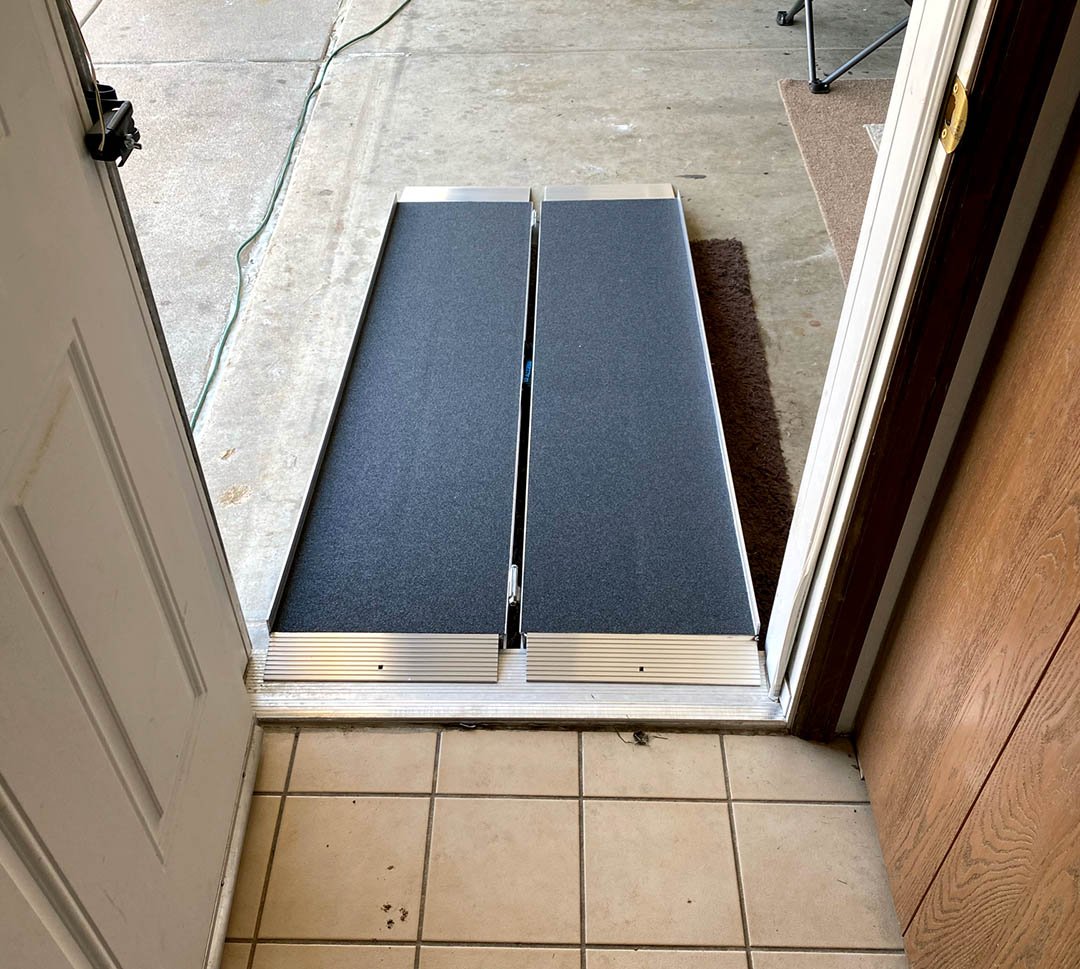
Wooden Wheelchair Ramp Pricing
Wooden wheelchair ramps are almost always custom-built to suit the entrance of a home or business. The cost of a custom-built wooden ramp can range significantly, and is influenced by the cost of wood, excavation of dirt or removal of bushes/trees or landscaping, the cost of labor, and any permits that may be required. One can expect to pay between $2,000 to $10,000, but costs can exceed $10k for a wooden wheelchair ramp.
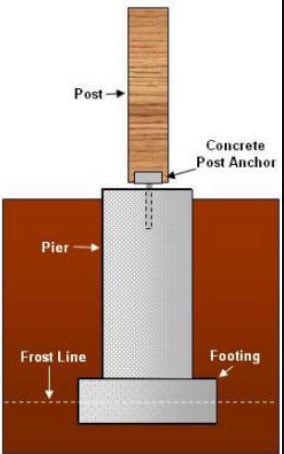
Wooden ramps are typically more expensive than aluminum ramps and can also be more costly to maintain. Wooden ramps that will be used on a long-term basis require sanding, sealing, staining, weatherproofing every 2 years especially in states with inconsistent and rough weather. Such maintenance extends the life of the ramp. Concrete footers (caissons - see image) may also be required in climates with 4 true seasons to prevent shifting of the ramp. When compared to an aluminum ramp that has adjustable feet, it's clear that aluminum has an advantage over wood in this regard.
These ramps can take 2-12 weeks to build from scratch. If Trex – a manufactured composite that is a blend of recycled plastic film and reclaimed wood fibers – or any other manufactured wood product is used, expect the cost of the materials to be significantly higher.
Check with your local office to make sure wood ramps are available as not locations offer wood ramps.
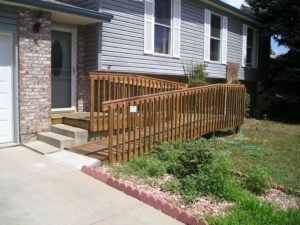
Concrete Wheelchair Ramps Pricing
A wheelchair ramp made out of concrete is also custom-built. The cost of materials, whether or not old concrete needs to be removed, the cost of labor, the minimum load charge (often a few thousand dollars alone in most cities), and the difficulty of the design all factor into the final cost. The cost of a concrete wheelchair ramp can range from $2,000 to above $10,000.
It's important to understand that in most cases, there is a minimum concrete load charge, often referred to as a "short load charge." In Denver, CO, for example, that charge is $2,000 just to have the cement mixer show up. Concrete, like metal and wood, also increases in price each year.
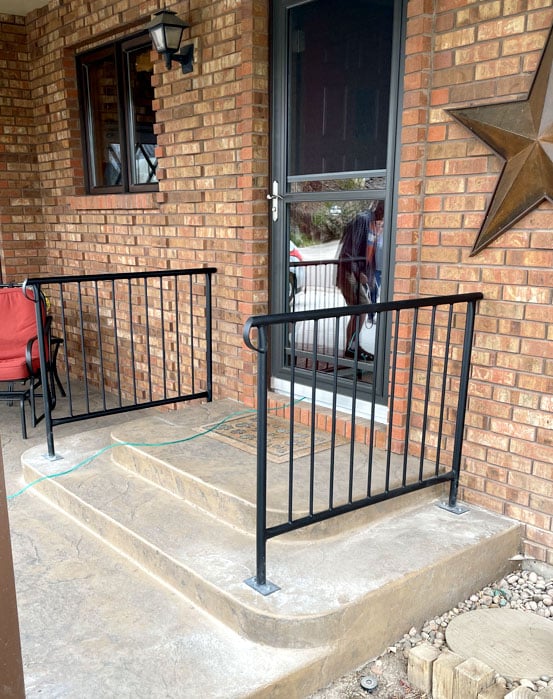
Custom-made steel handrails often go hand-in-hand with a concrete ramp, so that's an added expense. Steel handrails are not graspable compared to aluminum ramp rails that are more like grab bars and safer.
Concrete wheelchair ramps typically take a few days to pour and finish. The installation may also be delayed dependent on weather. Concrete can't be poured when it's raining. Maintenance is also required every few years to seal the concrete or patch cracks so that they don't expand.
*Not all Lifeway Mobility locations offer concrete wheelchair ramps. Check with your local office to confirm.
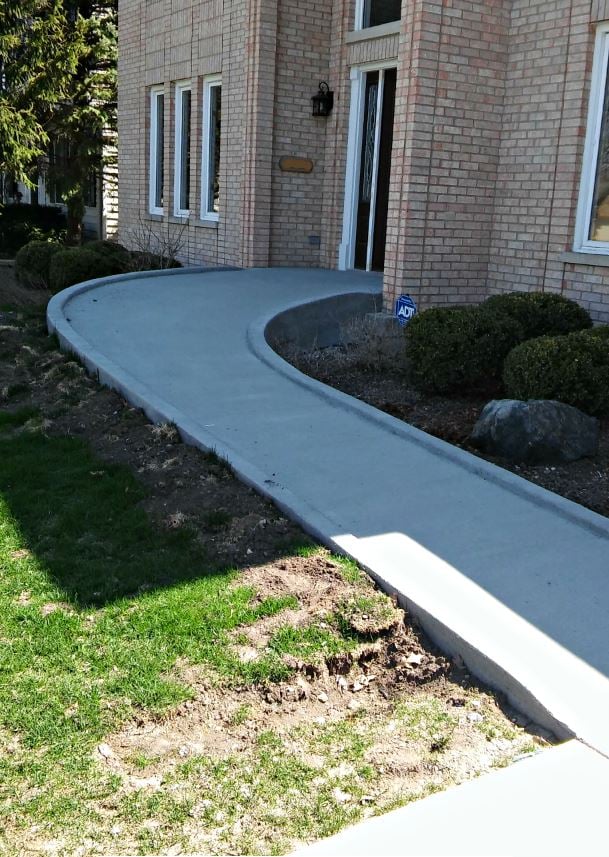
Rental Wheelchair Ramp Pricing
Renting a wheelchair ramp is the perfect short-term or temporary solution for accessing a raised porch, deck, or entry way. The wheelchair ramps that Lifeway Mobility offers that can be rented are typically pre-owned aluminum modular (rust-free) units that we store in our local warehouses. These types of ramps are relatively maintenance free and can be installed year-round.
A wheelchair ramp rental package includes, installation, removal, plus a monthly rate. The cost of the monthly rental fee depends on length and configuration of the ramp and other options (if applicable). Contact your local office to get the latest rental rates for a modular wheelchair ramp and to make certain YOUR local office offer rental wheelchair ramps.
*Check with your local Lifeway Mobility office to make sure they offer aluminum wheelchair ramp rentals.
Affordable Monthly Payment Plans (Financing) for Wheelchair Ramps
If you’d like to purchase new or used wheelchair ramp, but paying the entire cost upfront is not within your budget, some providers offer monthly payment options for qualified buyers. Check with your local Lifeway Mobility dealer to learn about available financing options for a wheelchair ramp.
Purchasing a Wheelchair Ramp Through a Dealer vs. Online
Online "deals" on wheelchair ramps are abundant, and the price at first glance may be considerably less than the price from a professional dealer like Lifeway Mobility. However, those prices typically do not include the cost of delivery, installation, or warranty coverage, all of which are included in most cases when sold by reputable dealers. Online prices may also include hidden fees.
Some online ramp providers market do-it-yourself installation as a way to save money. However, most quality ramp manufacturers such as EZ-ACCESS do not recommend DIY installations and only sell their products through certified dealers. Although wheelchair ramps are simple in function, the installation is a thorough and sensitive practice, especially if custom configurations are required.
Furthermore, online shops typically suggest nothing greater than 1:6 for slope, which is a stepper ramp and may not be the safest option. Trained professionals from a local dealer can come out to determine the appropriate slope and configuration where the ramp will be installed.
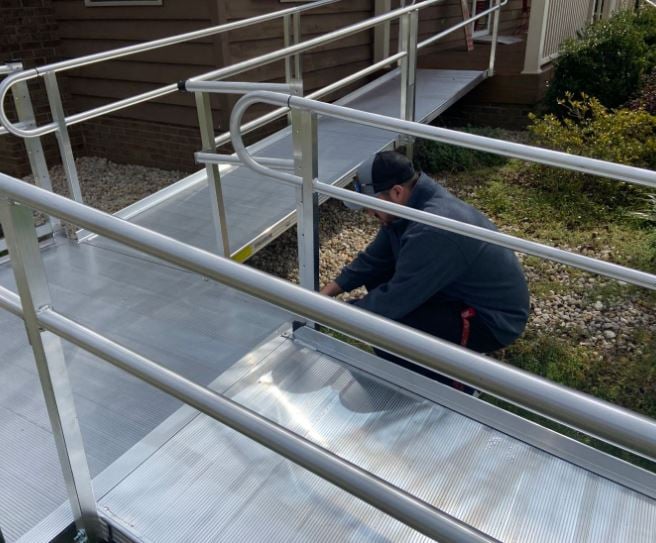
Lifeway Mobility's technicians are professionally trained & certified, giving us the ability to ensure that all installation and service jobs are of the highest quality. Additionally, Lifeway is both a licensed and insured wheelchair ramp company – something that most internet sellers can’t say.
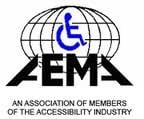 While it is a cost-saving measure, self-installation can put you, your family, or your home in harm’s way. The Accessibility Equipment Manufacturers Association (AEMA) provides the most knowledgeable information on home accessibility ramps. Your safety could be at risk!
While it is a cost-saving measure, self-installation can put you, your family, or your home in harm’s way. The Accessibility Equipment Manufacturers Association (AEMA) provides the most knowledgeable information on home accessibility ramps. Your safety could be at risk!
Conclusion
When compared to the cost of alternatives, such as moving to a single-story home, or a senior living facility, a wheelchair ramp can be one of the most cost-effective solutions for those that are unable to steps or another entry barrier. If you were to move into a senior living facility, you would pay between $1,500-$4,000/month and assisted living facilities are even more expensive, ranging between $3,500-$10,500/month, according to assistedliving.org. At that rate, a wheelchair ramp would have already paid for itself after only 1-2 months, typically. With the addition of a wheelchair ramp, you'll gain the benefit of being able to stay in the home and community that you have grown to know and love.
Through years of experience, Lifeway Mobility’s accessibility experts have handpicked the best wheelchair ramps available in the market that are the safest & most durable solutions for our customers.
Please contact us to set-up your FREE in-home evaluation to get an exact quote and better determine if a handicap ramp is the best option for you or your loved ones.
Additional Wheelchair Ramp Resources:
- The Ultimate Wheelchair Ramp Guide
- What is the Quickest Wheelchair Ramp Option?
- Wheelchair Ramps vs Wheelchair Lifts
- How Much Does a Platform Lift Cost?
